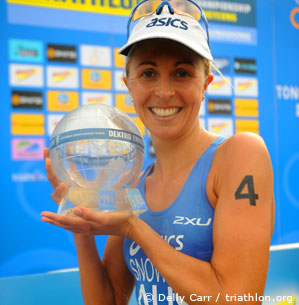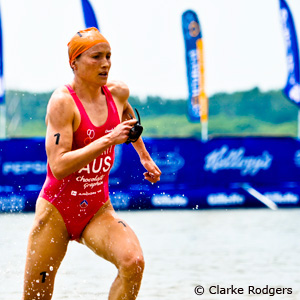Snowy is back!
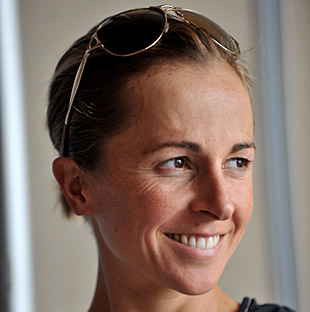
There was a sliver of hope that Emma Snowsill had been relegated to the ranks of the merely human after she was forced to take 11 months off for injuries, operations and illnesses between June 2009 and May 2010. And that sliver remained after Snowsill could manage just a 6th place in her first race back at the 2010 World Championship series race in Seoul South Korea.
The curtain of her invincibility had previously lifted a few times – when Vanessa Fernandes took many ITU World Cups and a world title in 2008 at the time when Snowsill was off form thanks to illness or injury. But Snowsill’s vulnerability looked greatest when training partner and fellow Emma – Miss Moffatt – beat Snowsill at the Washington DC round of the 2009 World Championship Series and outran Snowy at Hy-Vee for the $200,000 pot of gold later that month.
Those two losses, just before Snowsill decided to quit taking half measures and operate on a lingering labral tear injury last July, seemed to outsiders to be the kind of straight-up defeat that once seemed unthinkable. Then, after 11 months of treatment, rehab and a tropical virus she contracted, the 5-foot 3-inch 105-pound mighty mite prompted speculation that at age 28 she might be on the down curve. After all, how long could anyone expect such a slip of an athlete to remain such a dominant force?
Unburdened by an outsized ego, Emma Snowsill managed to quell all those doubts with a masterful come-from-behind win at Hy-Vee last month for her second $200,000 big win to add to her three World titles, and Olympic and Commonwealth Games gold.
Slowtwitch: Last year you continued to race well by anyone else’s standards despite fighting lingering injuries. At your worst, you placed second in two big races to your training partner, Emma Moffatt. Some wondered if you were the victim of A Star is Born scenario where your understudy, so to speak, was stealing your thunder. Why did you finally pull the plug on your 2009 season?
Emma Snowsill: Basically I was forced to make a decision to rest before I continued with any more races last summer. My injuries were the type anybody could have. But put them together it was like the straw that broke the camel’s back.
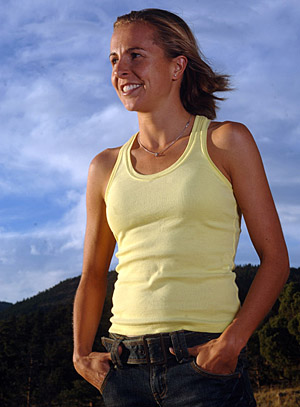
ST: What were they?
Emma: I cracked my rib earlier in the year surfing and having fun and just came back from that too quickly.
ST: How big was the wave?
Emma: Probably not big enough. (LAUGHS) I was surfing down at Byron Bay on Australia’s East Coast. My favorite spot. But I felt that is just the nature of the game. I am always pushing. But I think it makes it much harder to come back from injury when you try to do it too quickly. So I paid for it in the end unfortunately.
ST: The cracked rib may have complicated and delayed your full diagnosis of a serious hip injury. Through your career you had so often adapted to minor injuries and competed at a high level despite problems.
Emma: Finally we diagnosed my real problem with the hip, which was a labral tear. When they operated they basically just smoothed down the cartilage and hooked everything back up. It’s a pretty neat little keyhole surgery.
ST: It still took longer to recover than you thought? You pulled out of racing in late June and were thinking of coming back at the Grand Finale in the Fall?
Emma: I had basically recovered and was getting ready for the 2009 Dextro Energy Grand Finale on the Gold Coast in September. But ultimately I just did not leave myself enough time to have a chance to win. I just didn’t have it diagnosed quickly enough. If I’d had it diagnosed quickly enough and had the surgery done earlier, I would have easily been able to get ready for Gold Coast. It was just a time press. It was, after all, sort of a huge operation. When I decided to pull the pin on Gold Coast, it was a really hard decision. But looking back, it was a good one.
ST: You weren’t continuing to recover from the operation all the rest of the year?
Emma: Not at all. I got over my surgery and I decided to go to my best friend’s wedding in Bali. Liz Blatchford was marrying Glen Murray on October 15. That was good. It was my first holiday in 14 years. But I came back with a virus that knocked me out for three months in the [Australian] summer and I couldn’t get out of bed.
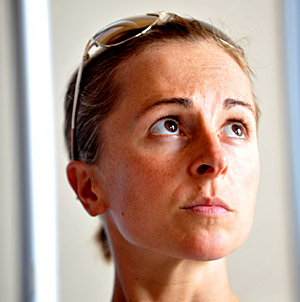
ST: You are familiar with what a virus can do to you after seeing what [your coach and fiancé] Craig Walton went through with a similar virus for 18 months near the end of his career. It must have been a bit frightening.
Emma: Yeah. That virus really knocked me out. Basically for three months I couldn’t get out of bed. Extreme fatigue. Weak.
ST: What is it called?
Emma: Cytomeglavirus. It’s a cousin of Epstein-Barre virus. So it is tough to go through that. But you have to learn the virtues of patience. And to know that your body needs to rest and it’s going to do what it’s going to do when it wants to do it. So that’s what I had to do, and allow it to do. Once I succumbed to that fact as what needs to be done, things started to move a lot quicker and I could get back to racing a lot sooner.
ST: How do you get through those low moments when you could not race?
Emma: I think you have to realize for every high there is a low and for every low there’s going to be a high. You have to remember that and make sure you learn things about yourself in that time that you may not have known and look forward to the time when you are going to rise again. And then you can build back up.
ST: Did this year off whet your hunger for training and racing?
Emma: Absolutely. It has reignited my passion and my motivation.
ST: Have you ever simply gone flat and lost inspiration?
Emma: No. I think I just got worn out after the Olympics. You have really underestimated the toll outside of training and recovering and the toll it takes on your body. It's a totally new experience. And until you are living it and breathing it and knowing what it is doing you don’t really understand. So I think that caught up with me.
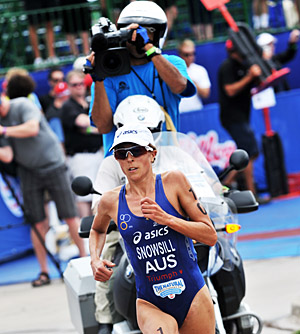
ST: Three months knocked out by that virus starting in late October last year means you could not start training again until February. So that 6th place at Seoul might have been better than most folks thought. How satisfied were you with your 10 seconds back finish in your first race back May 8?
Emma: To be honest I haven’t really thought about it. I went into that race really tired. I really forced my training upon myself in a short time. Look I was really happy just to be there close to the girls. Knowing it wasn't my best race. But I’ve got a ways to go to improve. But all in all, I was really really happy to be out there racing and enjoy it.
ST: After you finished 6th a month ago, how much better did your training go?
Emma: Look, it really lifted me to another level and not racing for 11 months it really helped me blow out the cobwebs. And I guess here I struggled in that race was the first 5k and I just made sure I really improved upon that. And In that time and obviously racing itself gives you a lift to that other fitness. I think look, I was just happy to be out here and enjoying being able to come back. This year I've got two little scars to remind me why I couldn’t perform for the rest of last year. So I guess its just about getting in amongst the girls and clawing my way back up there.
ST: Were you encouraged?
Emma: When I began to be able to regain my strength, I vowed that if I could get to Hy-Vee in good shape after how bad I was at this time last year, that would be fantastic. So the fact that I got so close to recovery from my injuries last September but was forced by the virus to continue to rest really was a bonus.
ST: How was your running in training?
Emma: It started to go well again. It's like anything. I wouldn’t say it's just my running. It’s all three disciplines have started to come back together. So that is all I can ask for. Based on, as I said, how sick I’ve been.
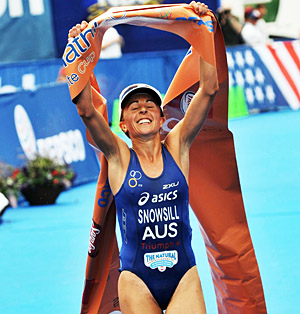
ST: Was there any strategy involved in Hy-Vee?
Emma: Honestly I can’t say I had a strategy again. This was my second race and Seoul was my first race in 11 months. So this is my second race in 12 months. This will still be getting out there and really getting into the swing of things on the race track. I know I am fortunate I am here and that is the only way I am looking at it.
ST: Was Hy-Vee your best come from behind win? You came off the bike 40 seconds down on the reigning World Champion and won by a similar amount.
Emma: I was pretty angry about the position I was in off the bike. I guess I am just not used to being out there among them and getting that quick start. I really had a great second lap of the swim but I just lost it in the first lap and I could not make it up. It is just one of those things you have to get out there racing and so I think just using the aggression about the position I was in when I came off the bike.
ST: Did you have allies in the chase pack?
Emma: I was really trying to motivate the girls. I knew I wasn’t riding as amazing as I could be. I was just trying to motivate the girls around me. Jillian Peterson was amazing. She was fantastic and really saved our race. She is a fantastic rider and all credit to her. She kept me in the race. And we just basically had to encourage each other to make up that distance and make sure they didn’t get behind. Because the race was going ahead in front of us. So we gotta make sure we were there to have any chance of finishing strong.
ST: When you were so far behind on the bike at Hy-Vee, did you think it was out of reach?
Emma: Oh absolutely. Yeah. I didn’t think I would be able to run to the front. I was angry about where I was when I came off. So I just used that aggression to pass as many girls as I could. To make sure this third one count. Even when I got to the front I didn’t know I could keep those girls at bay. I basically put my head down and thought all right this is it. Leave everything on the line.
ST: When you came up on the third lap to Emma Moffatt your old training partner, did she offer any resistance?
Emma: Honestly I was just listening to my own breathing and just trying to figure out where I was out. I didn’t think about it much. The most I worried was about Emma because I knew her strength. In that regard I knew I had to make my move then because I knew she had really fast finish and I could not leave my move until then.
ST: When did you think Hy-Vee was yours?
Emma: I checked with my coach just around the corner before we came in to make sure no one was going to come sprint me down because that is not my forte. (CHUCKLES.)
ST: Did this allay any lingering insecurity about getting back to your high standard of performance?
Emma: You mean in terms of where I’d been? I guess so. I guess it was a good 12 months benchmark for where I was this time last year. I was injured and really unaware of what was going on with my body and I think I was just overdone. I didn't take the time I needed after the Olympics and so I was mentally emotionally and physically down and needed to let my body catch up. So it was a blessing in disguise I guess. You have to go with what you’re given.
ST: Where is the gold medal?
Emma: Well it is usually at home in a bag or on the table depending on where I need to take it next. But while I’m away it goes to my parents house so it's safe. They take care of it.
ST: Ever have a flash to the moment in Beijing?
Emma: Do I ever think about it? No. Not unless I get asked about it. But I never get drawn back to it. My results aren't going to be based on where I've been. It’s only about where I’m going and what I’m continuing to still do. So you can't look back.


